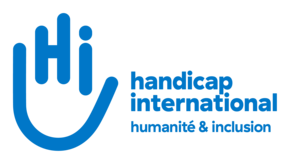Humanity & Inclusion
Humanity & Inclusion (formerly Handicap International[1][note 1]) is an international non-governmental organization. It was founded in 1982 to provide help in refugee camps in Cambodia and Thailand. Headquartered in France and Belgium, since its creation, it has opened branches in six other countries : Switzerland, Luxembourg, United Kingdom, Germany, Canada and the United States.
 | |
| Founded | 1982 |
|---|---|
| Founder | Jean-Baptiste Richardier
Claude Simonnot Yves Gaumeton |
| Founded at | |
| Type | International non-governmental organization |
| Location | |
Area served | 61 countries |
Official language | French |
Employees | 3,500 (field staff) |
| Website | |
It is an organization which aims to help disabled and vulnerable people in situations of poverty and exclusion, conflict and disaster.[2] More than 3,500 field staff are currently located in more than 60 countries worldwide.[2]
History
The organization was founded in France by two French doctors in 1982 to help people affected by landmines in Cambodian refugee camps.[3] The first orthopedic centers were set up in refugee camps in Thailand, Cambodia, Burma and Laos. Simple, locally available equipment was used to provide immediate, effective and practical aid, and local teams carried out the work. In 1986, Handicap International Belgium was set up, and the organization began to extend its work to other countries.
It is one of the 6 founding members of the International Campaign to Ban Landmines which received the Nobel Peace Prize in 1997.[4] Since February 2005, the organization has also been calling for a ban on cluster munitions and conducting research documenting the human impact of these weapons. Humanity & Inclusion is a founding member of the Cluster Munition Coalition, an international civil society campaign that works to erase the production and storage of all the munition.[5] In February 2006, Belgium became the first country to enact such a ban as a result of Handicap International's public awareness and advocacy efforts.[6] Handicap International has been a vocal advocate of the Convention on Cluster Munitions(CCM), an international treaty banning the use, transfer and stockpile of these weapons adopted on 30 May 2008 in Dublin, Ireland. There are currently 68 states that have ratified the CCM and 43 non-ratifying signatories.[7]

Humanity & Inclusion won the prize of the 2011 Conrad N. Hilton Humanitarian Prize, a $1.5 million prize, for its commitment to disabled people living in situations of poverty, exclusion, conflict or natural disasters. It is also a member organization of the International Disability and Development Consortium.
The Brazilian football player Neymar Jr. became an "ambassador" of Humanity & Inclusion on 15 August 2017.
The organization has been ranked the 8th best international NGO in the world in the NGO Advisor ranking 2017.[8]
The organization changed its name to Humanity & Inclusion in January 2018 to better communicate "the diversity of its activities, which are not confined to supporting people with disabilities."[1]
List of "ambassadors"
- Neymar Jr - footballer
- Ross Wilson - table tennis Paralympian
- Jack Hunter-Spivey - table tennis Paralympian
- Eddie Ndopu - activist and humanitarian
Notes
- On January 24th 2018, the global Handicap International network changed its name and became Humanity & Inclusion. This was done "to communicate more effectively on the diversity of its activities, which are not confined to supporting people with disabilities." In addition to the expanded scope of the organization's activities, the term "handicap" had been rejected by the people it was applied to because it had been imposed on them by social workers. See Nelson, Jack Adolph (1994). The Disabled, the Media, and the Information Age. Greenwood. p. 28.
“in keeping with the disability rights movement analysis of the situation—that the individual is okay but society has put him or her at a disadvantage—the term was nonetheless rejected when disabled people began wrestling the power of the programs that controlled their lives from social workers and began to run their own programs…if for no other reason that it was a term imposed on them by agencies.”.
For a discussion of the history of the term, see Amundson, Ron (n.d.). "About the Meaning of "Handicap"". hilo.hawaii.edu. Retrieved February 16, 2019.
References
- Humanity & Inclusion (February 3, 2018). "ISPO Partner Handicap International Becomes Humanity and Inclusion". www.ispoint.org. IPSO. Retrieved February 16, 2019.
- Handicap International UK. "Handicap International website". Handicap-international.org.uk. Retrieved 2012-03-14.
- "Archived copy". Archived from the original on 2012-03-05. Retrieved 2012-04-24.CS1 maint: archived copy as title (link)
- https://www.nobelprize.org/nobel_prizes/peace/laureates/1997/icbl.html
- http://www.stopclustermunitions.org/the-coalition/members/
- http://the-monitor.org/index.php/publications/display?act=submit&pqs_year=2009&pqs_type=cm&pqs_report=belgium&pqs_section=
- "Archived copy". Archived from the original on 2012-04-18. Retrieved 2012-04-04.CS1 maint: archived copy as title (link)
- "NGO ADVISOR : Searching The Planet For Non-Profit Excellence". NGO Advisor. Retrieved 2018-02-05.
See also
- List of disability rights organizations